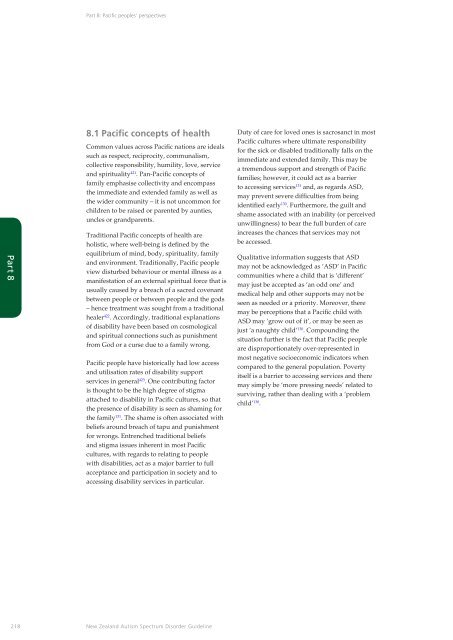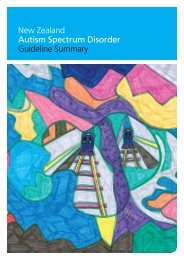New Zealand Autism Spectrum Disorder Guideline - Ministry of Health
New Zealand Autism Spectrum Disorder Guideline - Ministry of Health
New Zealand Autism Spectrum Disorder Guideline - Ministry of Health
You also want an ePaper? Increase the reach of your titles
YUMPU automatically turns print PDFs into web optimized ePapers that Google loves.
Part 8: Pacific peoples’ perspectives<br />
Part 8<br />
8.1 Pacific concepts <strong>of</strong> health<br />
Common values across Pacific nations are ideals<br />
such as respect, reciprocity, communalism,<br />
collective responsibility, humility, love, service<br />
and spirituality 421 . Pan-Pacific concepts <strong>of</strong><br />
family emphasise collectivity and encompass<br />
the immediate and extended family as well as<br />
the wider community – it is not uncommon for<br />
children to be raised or parented by aunties,<br />
uncles or grandparents.<br />
Traditional Pacific concepts <strong>of</strong> health are<br />
holistic, where well-being is defined by the<br />
equilibrium <strong>of</strong> mind, body, spirituality, family<br />
and environment. Traditionally, Pacific people<br />
view disturbed behaviour or mental illness as a<br />
manifestation <strong>of</strong> an external spiritual force that is<br />
usually caused by a breach <strong>of</strong> a sacred covenant<br />
between people or between people and the gods<br />
– hence treatment was sought from a traditional<br />
healer 422 . Accordingly, traditional explanations<br />
<strong>of</strong> disability have been based on cosmological<br />
and spiritual connections such as punishment<br />
from God or a curse due to a family wrong.<br />
Pacific people have historically had low access<br />
and utilisation rates <strong>of</strong> disability support<br />
services in general 423 . One contributing factor<br />
is thought to be the high degree <strong>of</strong> stigma<br />
attached to disability in Pacific cultures, so that<br />
the presence <strong>of</strong> disability is seen as shaming for<br />
the family 131 . The shame is <strong>of</strong>ten associated with<br />
beliefs around breach <strong>of</strong> tapu and punishment<br />
for wrongs. Entrenched traditional beliefs<br />
and stigma issues inherent in most Pacific<br />
cultures, with regards to relating to people<br />
with disabilities, act as a major barrier to full<br />
acceptance and participation in society and to<br />
accessing disability services in particular.<br />
Duty <strong>of</strong> care for loved ones is sacrosanct in most<br />
Pacific cultures where ultimate responsibility<br />
for the sick or disabled traditionally falls on the<br />
immediate and extended family. This may be<br />
a tremendous support and strength <strong>of</strong> Pacific<br />
families; however, it could act as a barrier<br />
to accessing services 131 and, as regards ASD,<br />
may prevent severe difficulties from being<br />
identified early 130 . Furthermore, the guilt and<br />
shame associated with an inability (or perceived<br />
unwillingness) to bear the full burden <strong>of</strong> care<br />
increases the chances that services may not<br />
be accessed.<br />
Qualitative information suggests that ASD<br />
may not be acknowledged as ‘ASD’ in Pacific<br />
communities where a child that is ‘different’<br />
may just be accepted as ‘an odd one’ and<br />
medical help and other supports may not be<br />
seen as needed or a priority. Moreover, there<br />
may be perceptions that a Pacific child with<br />
ASD may ‘grow out <strong>of</strong> it’, or may be seen as<br />
just ‘a naughty child’ 130 . Compounding the<br />
situation further is the fact that Pacific people<br />
are disproportionately over-represented in<br />
most negative socioeconomic indicators when<br />
compared to the general population. Poverty<br />
itself is a barrier to accessing services and there<br />
may simply be ‘more pressing needs’ related to<br />
surviving, rather than dealing with a ‘problem<br />
child’ 130 .<br />
218<br />
<strong>New</strong> <strong>Zealand</strong> <strong>Autism</strong> <strong>Spectrum</strong> <strong>Disorder</strong> <strong>Guideline</strong>











